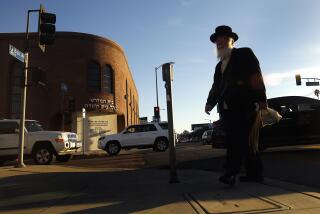For the Faithful, a Journey of 71/2 Years Ends and Begins Anew
- Share via
To Rabbi Yitzchok Adlerstein, the ultra-contemporary Walt Disney Concert Hall was an apt setting to hold a ceremony Tuesday marking the end of the 7 1/2 -year cycle of reading the ancient texts of the Talmud one page a day.
With similar Siyum HaShas celebrations being held worldwide, about 3,000 mainly Orthodox and Hasidic Jews -- many in traditional knee-length coats and black hats or business suits and yarmulkes -- crowded into the downtown Los Angeles landmark of shimmering metal.
“I think Frank Gehry would approve,” the rabbi, a spokesman for the event, said of the building’s architect. “Part of the beauty of the Talmud is that you are working with a document that is a few thousand years old .... You cut through the different epochs of history and when you get to the core understanding you find things that are applicable very much to the present.”
The Daf Yomi, or “page a day” study program concludes a 2,711-day spiritual odyssey and begins another cycle. “Human beings seem to enjoy a challenge for the sake of challenge,” said Adlerstein, who teaches at the Yeshiva of Los Angeles. “In the end you have more to take home than a medallion, you have a changed soul and a changed cerebral cortex.”
Accompanied by relatives and friends, about 120 people from the Los Angeles area who completed the demanding study celebrated with music, circle dancing and prayers.
Bob Rechnitz was among those who finished the reading for the first time. He travels extensively for his Los Angeles-based real estate development business and viewed the daily study as a way to keep consistency and spirituality in life. “There’s not a city I’ve been to around the world where you cannot find a study group,” he said.
“This is a perpetual cycle, the cycle of life,” he said. “There is no beginning and there is no end.”
Dr. Ernest Agatstein, a clinical professor of urology at UCLA School of Medicine who also works at Centinela Hospital, completed his third full cycle. He credited his wife for her support in allowing him to study an hour every night with a group at Young Israel of Hancock Park.
“The first time you do it is like the first time you run a marathon or when you graduate from medical school. It is such an arduous task you want to celebrate,” he said.
Written in Aramaic and Hebrew, the Talmud is a guidebook to daily living for the faithful and consists of interpretations of the Torah, the first five books of the Jewish Bible.
It includes Judaism’s early oral tradition as well as subsequent commentaries from sages. The Talmud instructs, among other things, on matters of prayer, ethical business dealings, observing the Sabbath, kosher rules, and the laws of marriage and divorce.
“There is nothing in Jewish life that evades a Jewish law,” Adlerstein said.
“Every moment in life, every single pedestrian part of life can be elevated, turned into something higher.”
The Daf Yomi tradition is completing its 11th cycle since beginning in Europe in 1927. Its popularity is growing, with the number of North American groups dedicated to daily study nearly doubling to 900 since 1997, organizers report.
This year more than 120,000 people were expected to participate in similar events across North America, including the largest celebrations at Madison Square Garden in New York and the Continental Airlines Arena in New Jersey.
All the cities were connected by satellite television feeds.
In other uses of modern technology, the Talmud lessons are on the Internet and have been recorded on mp3 files.
“I’ve done the Daf Yomi on a train rounding the northern tip of Taiwan,” Adlerstein said.
“I’ve done it in Australia. The fact that you have to do it every day has you sharing the experience with so many people, past and present generations and so many people across the globe,” he said.


